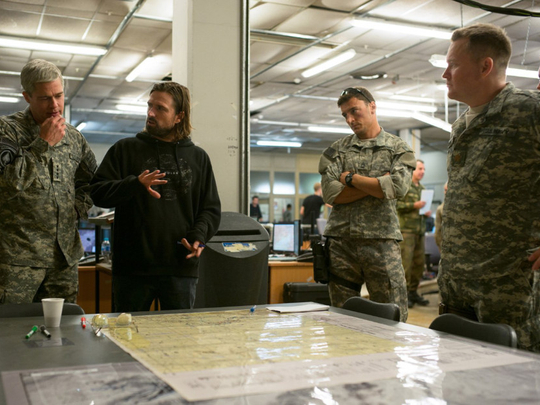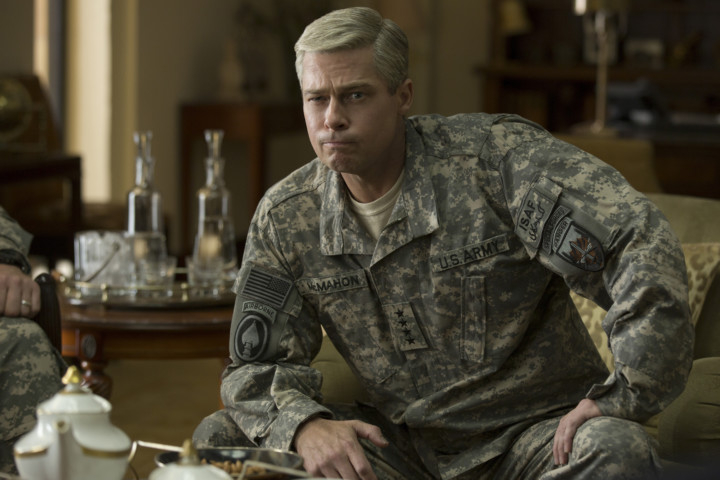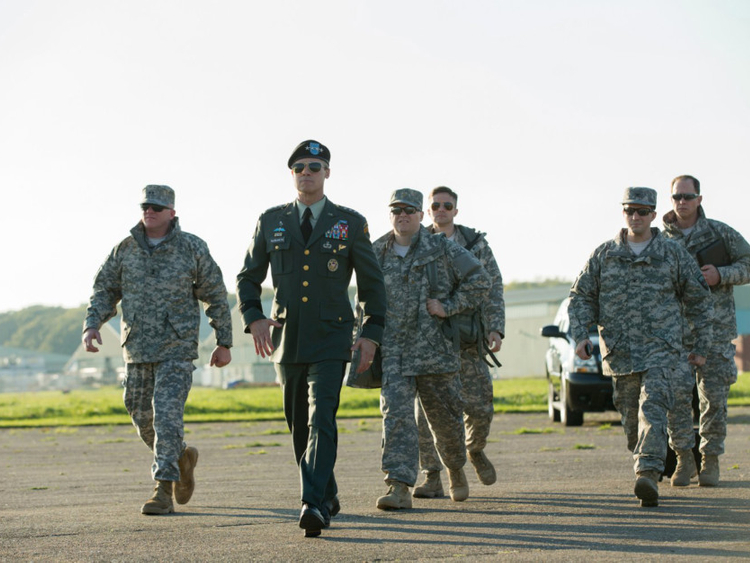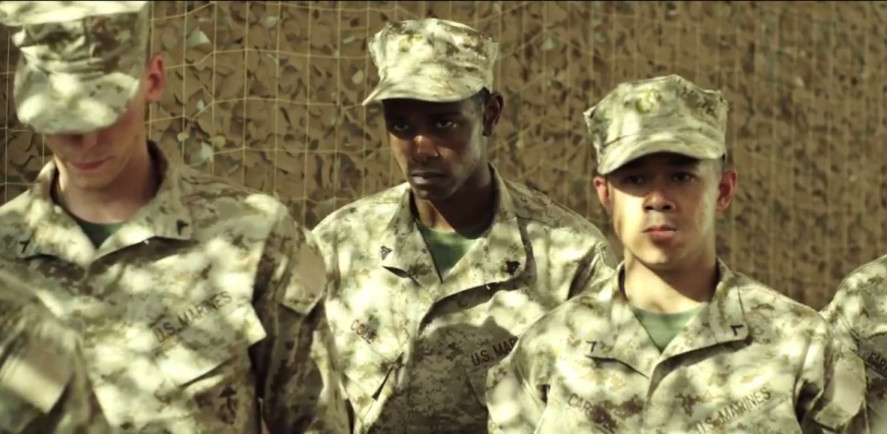
To say director David Michod has had an unusual career arc is to say Australia is a little far away.
The Sydney-based Michod, 44, went from making his Ma Barker-ian Sundance sensation Animal Kingdom (and, later, its TV series) to the dystopian Rob Pattinson Western The Rover to, now, War Machine, an anti-military polemic starring Brad Pitt.
The Netflix production, in its second weekend on the service, thinly fictionalises the story of Gen. Stanley McChrystal that’s told in Michael Hastings’ The Operators. The late journalist’s book about the commander of US forces in Afghanistan grew out of Hastings’ much-publicised Rolling Stone piece that led to the general’s resignation from the Army; the movie adapting it is filled with both absurdist episodes from McChrystal’s tenure and eloquent voice-over, written by Michod, about the US military and modern war.
We caught up with the director over lunch on a recent trip to the US.
A war picture isn’t something one imagines you taking on based on your previous work. Why did the genre captivate you?
I’d been wanting to make a war film for a while. [Laughs.] Maybe it’s a continuation of my obsession with hermetically sealed bubbles of delusional men. But I hadn’t been able to find my way in. I would have assumed once upon a time that it would have to be something dark and brutal and menacing. And then Dede and Jeremy [Gardner and Kleiner, Pitt’s producing partners at Plan B Entertainment] brought me the book. And that “in” was absurdity. I instantly saw a movie that would fit in the great tradition of American war comedy.
The word divisive has been tossed at War Machine. Do you think that’s fair?
This film is vehemently anti-war, so I get that people will think that. But I think it’s also politically ambiguous. These wars are not about parties — Afghanistan was started by Republicans and continued by Democrats and then picked up by whatever ... this current administration is.
I think that divisiveness is partly because, from many of the pronouncements in the film, it seems you’re opposed to any kind of counter-insurgent war, regardless of the particulars. Is that true?
Yes. I think all counter-insurgency is by definition folly — the idea that you can build nations in your own image, which is what counter-insurgencies are. The movie for me is commenting on these great machines that are built to achieve that. These machines, made up of men, can all be dressed up in the babble of military acronym and self-important strategic positions but actually what you’re looking at more often than not is really just men and their ambitions and vanities and career aspirations.
That’s a core critique of the film: that it’s not the particular people running the wars, which we get so hung up on, but that any people will end up in the same position.
These counter-insurgencies stretch out indefinitely because they’re being run by men who can’t win and can’t face the fact that they can’t win. So they have to invent strategies that seem to present a path to victory even if those paths are total fantasy. And the higher up the ladder you climb the more in a bubble you find yourself. And the more in a bubble, the more these delusions start to seem real. My point is the question to be asked isn’t so much about the political underpinnings of war but the seemingly unchecked power of the war machine itself.
But we’ve now wound down the wars of the 2000s and are somewhat more reluctant to jump into that kind of war with the likes of Daesh. Don’t you think we’ve learnt from the mistakes you document?
But we’ve been thinking about surging in Afghanistan again. And I don’t care who is in the White House but if that’s something we’re seriously contemplating, well, what is that going to achieve? Remember, the military is supposed to work for us.
Some of the criticism of War Machine has been about the message but some has also been about the fictionalisation — McChrystal is really nothing like this in real life, but people watching it are obviously supposed to think it’s him. Did those liberties give you pause?
I made the decision early on to change character names early on because I wanted creative freedom and wiggle room. But I also did it because I wanted it to be about a larger war machine, not specific individuals.
But people think that what they’re watching is true since many of these characters are clearly based on real figures. Isn’t that two-footing it?
I think all biopics are fiction; I never feel comfortable with the idea that I know exactly what a person is like or what their private conversations are like. So to be able to say from the outset [as an audience member] that “I know it will contain characters and events that seem familiar but it’s not to be taken as documentary fact” I think is good. It’s not dissimilar to what I did with Animal Kingdom, where it’s based very loosely on a criminal history in Melbourne but people understood — or hopefully understood — that it wasn’t an actual history. As long as you make clear these characters are your own invention I think it’s OK. It’s a lot more preferable to movies that purport to be true.
You’re also turning the McChrystal story into comedy, which you could argue is a bit of a cheat. Like, when your critique doesn’t hold up you can say “well, it’s just a comedy, so don’t hold it to the same scrutiny.”
Maybe I’m wanting to have it both ways. And maybe there’s nothing wrong with that. I think all great war comedies — Catch-22 and Strangelove and M*A*S*H” — have something at their core that is true. And yet all those filmmakers choose to tell their story through comedy precisely for the same reason I did: because comedy can amplify the absurdity and nonsense of war. Public figures of great power need to be held under a microscope even if that microscope is a comedic one.
Brad’s portrayal of McChrystal — mannered, weird, occasionally funny, often clueless — is divisive in its own right. How did that come about?
I understood from the beginning how it could be divisive. He made a decision early on that he needed to do it that way to service this kind of story. The [crazy] nature of the movie, the schism between the ground and the fantasyland, meant committing to this bold and wild and goofy performance, almost to bridge that gap.
How much of what he’s doing is emulative of the real McChrystal?
None of it. The running. Just the [loping, legs-apart] style of jogging. That’s it.
Netflix was willing to finance your movie at twice the budget [$60 million] than New Regency and other traditional studio financiers who initially were developing or interested in it. But of course Netflix doesn’t really put films in theatres. Were you concerned about that trade-off?
We were never not aware we were making a film that was politically contentious and tonally complex. We needed money to make it, because it wasn’t going to be made cheap — we ended up shooting in six different countries. And you could feel right away the numbers were going to make the traditional studios nervous — they don’t make movies like this anymore. “How’s it going to play in Middle America? How’s it going to play at the box office?” I don’t think they could wrap their brains around it. So we said we could take a long time shopping it around town, slowly running it through a machine to mash it into a shape that suited other people’s needs. Or we could make it with the kind of freedom we knew we wanted to.
And the theatres ...?
I love watching movies on the big screen but I don’t do it that often. And I knew this could be seen by many tens of thousands more people that had seen my previous movies combined. So it was the freedom but also the base of availability that I thought was the game changer.
There are people who will see this film and come away thinking “Michod is just opposed to war generally and that’s just unrealistic.” What do you say to them?
Humans have been fighting each other since they came out of the swamp. There’s no denying that wars will always be fought. But just because war is a fact of human civilisation doesn’t mean we shouldn’t be questioning which we choose to fight and how we choose to fight them.
The honourable thing we can do is say respect the troops and thank them for their service. But maybe the truly honourable thing is to hold them to account; when they talk about victory and doubling down missions they need to be able to explain what that victory looks like and how it can be achieved. Because you can’t just say you should spend trillions to justify the money and lives already spent.
Don’t miss it
War Machine is now streaming in the UAE.















